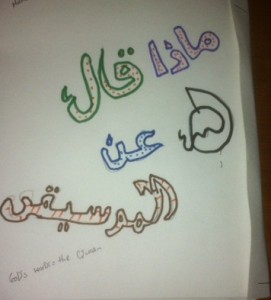What did the Q’uran say about music?
Throughout the entire semester, when we talked about music, there was a lot of controversy regarding that issue. One of most explicit illustration of this controversy or ban on music was in Little Mosque Poems:
“Music is banned
at my little mosque
because it is played on
the devil’s stringed instruments”
This really shocked me especially after I had read Music and Dance in Sufism. Music plays a very important role in Sufism; it is a spiritual experience… a way of longing for God. They have the Qawwali and the Sama’. Qawwali music focuses on Hamd or praise for God and munajah or the conversations and gratitude the “singer” has with God. Sama’ also includes listening, dancing and reciting poetry; tambourine and flute are even used in Sama’.
In Egypt, I have heard many Imams arguing in Friday prayers that music is completely banned in Islam, and so reading about how essential it is in sufism led me to open the Q’uran again and find it what the primary source in islam says about music. I created this simple book entitled “What does the Q’uran say about music” and then when one opens the book, he finds nothing because the Qu’ran didn’t explicitly mention music or musical instrument and yet we have all those imams in Egypt and in other areas in the Middle east (the ones little mosque talks about), who repeatedly condemn music and view it as an imitations of “infidel” cultures.

